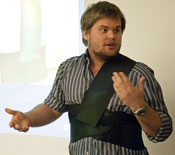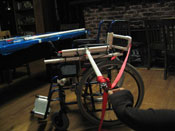|
Winter Quarter 2012
|
|
Course Overview Perspectives in Assistive Technology is a Winter Quarter course for students to learn about issues surrounding the design and use of technology that benefits people with disabilities and seniors. This three-credit course consists of twice-weekly presentations by guest lecturers and tours of local medical facilities and engineering labs. Students pursue team-based projects that address problems faced by users of assistive technology. Lectures are open to all students and community members. For students whose schedule does not permit working on a team-based project, one-unit lecture-only options are offered. ENGR110 is a certified Service Learning course that satisfies the optional course requirement for the BSME degree and is an approved course for the Program in Science, Technology & Society. The course objectives are to:
Students can pursue further prototyping, fabrication, user testing, and iterative design for credit in the Spring Quarter as an independent study project (for graduate students) or a senior project in ME113 or CS194. For more information, see the course syllabus. |
|||||
|
||||||



